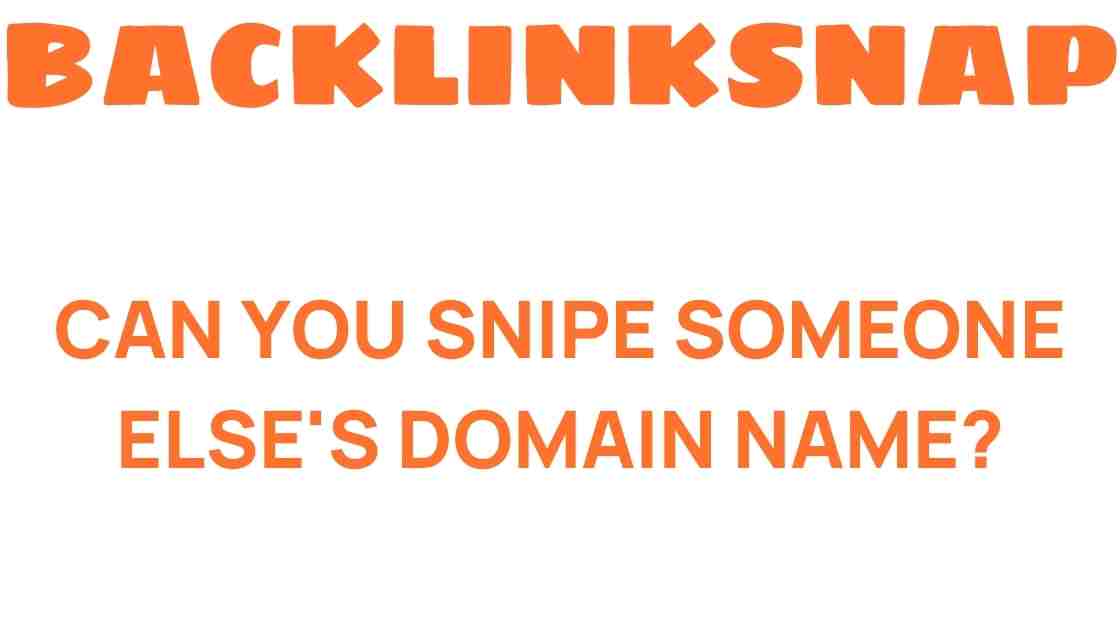Can You Snipe Someone Else’s Domain Name? Unraveling the Mystery
In today’s digital landscape, domain names are akin to real estate; they’re valuable assets that can significantly impact online branding and business identity. With the rise of online entrepreneurship, many individuals and companies find themselves asking the question: can you snipe someone else’s domain name? This article delves into the intricacies of domain name sniping, domain acquisition, and the ethical and legal aspects surrounding this practice.
Understanding Domain Name Sniping
Domain name sniping refers to the practice of attempting to acquire a domain name that is currently registered to someone else. This often occurs when a domain name is set to expire, allowing a savvy buyer to swoop in and register it before the original owner can renew it. While this can sound tempting, it’s essential to understand the broader implications of domain name sniping, including legal issues, potential disputes, and the ethics involved.
The Process of Domain Acquisition
Acquiring a domain name, whether through sniping or legitimate purchase, involves several steps:
- Research: Before making any moves, research the domain name’s current status. Tools like WHOIS lookup can provide information about the current registrant.
- Monitoring Expiration: Keep an eye on domains that are nearing expiration. Many domain registrars offer services that notify you when a domain is about to become available.
- Backordering: Some registrars allow users to place backorders on domains. This means that if the domain becomes available, the registrar will attempt to acquire it on your behalf.
- Negotiation: If the domain is actively owned, consider reaching out to the current owner to negotiate a purchase. Many domain owners are open to selling, especially if approached respectfully.
The Ethics and Risks of Domain Name Sniping
While domain name sniping may seem like a savvy business move, it can also lead to ethical dilemmas and potential legal challenges. Here are some critical points to consider:
- Cybersquatting: This illegal practice involves registering domain names that are identical or confusingly similar to existing trademarks with the intent to profit from them. Engaging in cybersquatting can lead to legal action from the trademark owner.
- Domain Disputes: If a domain name you acquire is similar to an existing brand or trademark, you may face disputes. The Uniform Domain-Name Dispute-Resolution Policy (UDRP) provides a framework for resolving these conflicts.
- Reputation Risk: Engaging in aggressive domain name sniping can damage your reputation, especially if you’re seen as trying to undermine another business. Building a positive online presence is crucial for long-term success.
Trademark Issues in Domain Name Sniping
Trademark law plays a significant role in domain name registration. If you aim to acquire a domain name that is similar to a trademarked term, you might encounter legal hurdles. Here’s what you need to know:
- Trademark Search: Before attempting to acquire a domain, conduct a trademark search to ensure you’re not infringing on someone else’s intellectual property.
- Legal Consequences: If you register a domain that violates trademark rights, you could face litigation, resulting in costly legal fees and the loss of the domain.
- Best Practices: When choosing a domain name, opt for unique names that don’t resemble existing trademarks to avoid potential issues.
Digital Real Estate and Online Branding
In the digital age, your domain name is an integral part of your online branding strategy. Here’s how to approach domain name acquisition for effective branding:
- Choose Wisely: A good domain name is memorable, easy to spell, and reflective of your brand identity. Avoid long and complex names that may confuse potential visitors.
- Protect Your Brand: Consider registering similar domain extensions (e.g., .com, .net, .org) to protect your brand from competitors who might try to snatch up similar domains.
- Brand Consistency: Ensure that your domain aligns with your overall branding strategy, as this consistency fosters trust and recognition among your audience.
Conclusion
Domain name sniping can be a tempting endeavor but comes with a host of ethical, legal, and reputational considerations. It’s essential to approach this practice with care, ensuring that you respect existing trademarks and the rights of current domain owners. Ultimately, focusing on legitimate acquisition strategies and building a strong online presence through thoughtful branding will yield more sustainable results in the long run.
FAQs
- What is domain name sniping? Domain name sniping is the practice of acquiring a domain name that is currently registered to someone else, often by waiting for it to expire.
- Is domain name sniping legal? While acquiring an expired domain is generally legal, attempting to register a domain similar to a trademark can lead to legal issues, such as cybersquatting.
- What is cybersquatting? Cybersquatting occurs when someone registers a domain name that is identical or similar to a trademark with the intent to profit from it.
- How can I protect my brand from domain snipers? Register multiple domain extensions and similar names to protect your brand, and monitor your domain regularly.
- What should I do if someone registers a domain similar to my trademark? You may consider filing a complaint through the UDRP or seeking legal advice to resolve the dispute.
- Can I negotiate for a domain name I want? Yes, reaching out to the current owner to negotiate a purchase is a common practice.
For further reading on domain acquisition strategies, check out this comprehensive guide on domain registration. Remember, the digital landscape is vast, and with the right strategies, you can secure your piece of digital real estate without stepping on anyone’s toes.
This article is in the category Digital Marketing and created by BacklinkSnap Team




